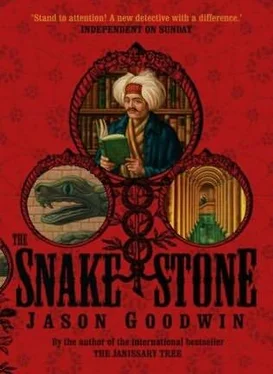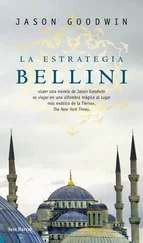Jason Goodwin - The snake stone
Здесь есть возможность читать онлайн «Jason Goodwin - The snake stone» весь текст электронной книги совершенно бесплатно (целиком полную версию без сокращений). В некоторых случаях можно слушать аудио, скачать через торрент в формате fb2 и присутствует краткое содержание. Жанр: Исторический детектив, на английском языке. Описание произведения, (предисловие) а так же отзывы посетителей доступны на портале библиотеки ЛибКат.
- Название:The snake stone
- Автор:
- Жанр:
- Год:неизвестен
- ISBN:нет данных
- Рейтинг книги:4 / 5. Голосов: 1
-
Избранное:Добавить в избранное
- Отзывы:
-
Ваша оценка:
- 80
- 1
- 2
- 3
- 4
- 5
The snake stone: краткое содержание, описание и аннотация
Предлагаем к чтению аннотацию, описание, краткое содержание или предисловие (зависит от того, что написал сам автор книги «The snake stone»). Если вы не нашли необходимую информацию о книге — напишите в комментариях, мы постараемся отыскать её.
The snake stone — читать онлайн бесплатно полную книгу (весь текст) целиком
Ниже представлен текст книги, разбитый по страницам. Система сохранения места последней прочитанной страницы, позволяет с удобством читать онлайн бесплатно книгу «The snake stone», без необходимости каждый раз заново искать на чём Вы остановились. Поставьте закладку, и сможете в любой момент перейти на страницу, на которой закончили чтение.
Интервал:
Закладка:
But nobody had.
“And in his work-your father is happy?”
“My mother says he is happy. He is proud to be a waterman. I think-I think he works very hard.”
“I am sure. Your mother-she doesn’t know where he might have gone?”
Suela gave her mother a frightened glance. “No.”
“Friends?”
The girl looked uncertain. She repeated the question to her mother, who merely shook her head and looked sadly again at Yashim. “Istanbul,” she whispered.
“My father and mother do not have friends in Istanbul,” Suela explained quietly.
Yashim pulled at his lip. “You say he liked his job, and he worked hard. Did he work the same hours every day?”
Suela screwed up her face, to remember. “In the beginning, he was always at home for supper. But he stayed at work very late, before he-he…” Her lip trembled.
“I understand,” Yashim said quickly. “Every evening, or just sometimes?”
“Just sometimes.” Suela turned to her mother. The two spoke together for several minutes. When Suela turned to Yashim her chin was tilted.
“My mother says that he stayed out quite late three times last week.”
“Do you know why?”
Mrs. Xani cast her eyes vaguely around the room. “My mother,” Suela translated eventually, “says that they had problems with the water.”
“Yes,” said Yashim slowly. “Yes, I think there have been some difficulties.”
He got up. He wanted to add, Your debt is paid. But the words stuck in his throat, as if they carried a meaning that no one wanted to hear.
56
Yashim descended the hill by the Sublime Porte and crossed in front of the Nurisyane, where he had found the litter bearers the night before. Passing the entrance to the Egyptian bazaar he hesitated, then plunged in. The rich aromas of cinnamon and cloves, of cumin, coriander, and pounded ginger made his head whirl. Mountains of vividly colored powder rose on every stall, pungent spices gathered from all across the world, from the coasts of India and the mountains of China, from Persia and Arabia and the islands of the South Seas, brought here to this great entrepot of the world’s trade by dhow, by carrack, by camel train and mule train, over deserts, through wild seas, crossing the passes of legendary mountain ranges, bartered and bought, fought for and pilfered, growing ever more valuable and rare until, at last, they reached this market on the edge of Europe, and vanished into a soup, or a dish of rice.
Yashim paused, dizzied by the reflection. What a world men had made! What adventures they undertook, simply to give color and pungency to their diet! The bazaar was a treasure-house-yet nothing would be changed if a wind scattered the powders to the skies; no one would starve; empires would not fall. The very stones of the bazaar would reek of spices a thousand years from now: what of it?
For something as trivial and evanescent, men could be killed. For an idea as immaterial as the scents that rose from the multicolored hillocks of ground seeds, people were prepared to die. An immigrant in the city, struggling to better himself and provide for his children, disappeared: for what? Nothing stolen, as it seemed. No one ate better. But perhaps an idea had been realized, a dream had been served. Lefevre: dead in the street. No money on him, nothing taken. Killed for a book, perhaps: a few scraps of observation about a city that no longer existed, the thoughts and memories of men long since dead and gone. The city still lived and breathed and ate and slept. A pilaf could be eaten without saffron.
He left the Spice Bazaar by the northern gate, to wind his way through the alleys and arcades of the Grand Bazaar. He bought a new shawl and examined some old Korassian carpets; he dithered over a selection of English padlocks, before deciding that he didn’t need one, bought some plain china plates, and finally walked home through the Book bazaar. Goulandris’s shop was shuttered.
Widow Matalya and her ladies had done a thorough job. The floors were scrubbed. The walls had been whitewashed again, and they glowed in the golden afternoon light. His landlady had found a carpet for the sofa and replaced some of the cushions, but the empty bookshelves looked skeletal. Of his kitchen and its stores, only the metalware remained, iron pots and knives. The room smelled of soap.
Yashim sat down on the edge of the sofa and unwrapped a tiny parcel from the Egyptian market. The folded paper contained a single yellow block of ambergris, the strangest substance in the pharmacopeia of spices, and so rare that one sultan had been censured for using it on his beard. Ambergris was gathered from the Atlantic Ocean, hundreds of miles away, taken, so Yashim had heard, from the belly of the whale.
Its odor was sweet, yet not cloying; it was also irresistible, all-pervasive, the strongest, most penetrating scent in the whole world. Yashim lay back on the divan, with the tiny lump of ambergris resting on his own belly.
Slowly its scent stole out across his bare room, possessing it invisibly, permeating the air.
57
Stanislaw Palewski had tucked himself up in the window seat of his sitting room with a glass at his elbow, Gyllius in his hand, and a bottle not far away, before he became aware that there was something unusual about his room.
He looked around, mystified. He glanced out of the open window. The girl, Suela, was sitting under the tree, watching her brother playing in the dirt with a stick and with a concentrated look on his face. Palewski sniffed the air, then his glass. His gaze fell on the sideboard, beneath the oil portrait of Jan Sobieski, the victor of Vienna. He looked at the sideboard for quite a while, and then, with a puzzled grunt, he got up and went over to look at the flowers.
Marta had filled a very beautiful vase with late-flowering tulips, the Turkish sort, with frilly petals. It seemed to Palewski, as he ran his finger over the surface of the sideboard, that she had polished that as well.
He went back to his seat, wedged himself into it with his knees up and his feet against the shutter board, and took a drink.
It was all very extraordinary, he thought to himself. Poor Marta! This business with Xani must be upsetting her more than he’d thought.
Where the devil, he wondered, had the wretched man got to?
58
Yashim riddled the stove, threw on some coals, and blew on them until they caught. While the charcoal heated, he unpacked his basket. Flour, rice, oil: he had bought replacements, but he would have to look for some new containers. A pat of butter, wrapped in paper. He frowned, thinking ahead; he had forgotten pepper.
He went to the window and looked down into the alley. It was empty. He leaned farther out and shouted: “Elvan!”
He went back to the fire, took out three ripe eggplants, and wiped them with a damp cloth. He laid them on the coals, then took a knob of butter and dropped it into a small pan. On an impulse he lifted the pan to his nose and sniffed: it smelled perfectly clean, however, so he put it down guiltily on the side of the brazier, where the butter would melt.
He turned the eggplants and went back to the window. “Elvan!”
The butter was sliding off across the pan, so he stirred it with a wooden spoon, watching it begin to bubble. He took a big pinch of white flour in his left hand and began to sift it slowly over the butter, still stirring; as he watched, it began to form soft crumbs and then a yellow ball.
He took the pan off the heat, turned the eggplants again, and went to the window.
A small boy was standing in the alley with his hands on his hips.
“Elvan! It’s me, Yashim!”
The boy looked up.
“Some milk, please. And white pepper, if you can get it,” Yashim shouted. Elvan held up a hand, Yashim flipped a coin, and the boy dived and caught it, as he always did.
Читать дальшеИнтервал:
Закладка:
Похожие книги на «The snake stone»
Представляем Вашему вниманию похожие книги на «The snake stone» списком для выбора. Мы отобрали схожую по названию и смыслу литературу в надежде предоставить читателям больше вариантов отыскать новые, интересные, ещё непрочитанные произведения.
Обсуждение, отзывы о книге «The snake stone» и просто собственные мнения читателей. Оставьте ваши комментарии, напишите, что Вы думаете о произведении, его смысле или главных героях. Укажите что конкретно понравилось, а что нет, и почему Вы так считаете.












